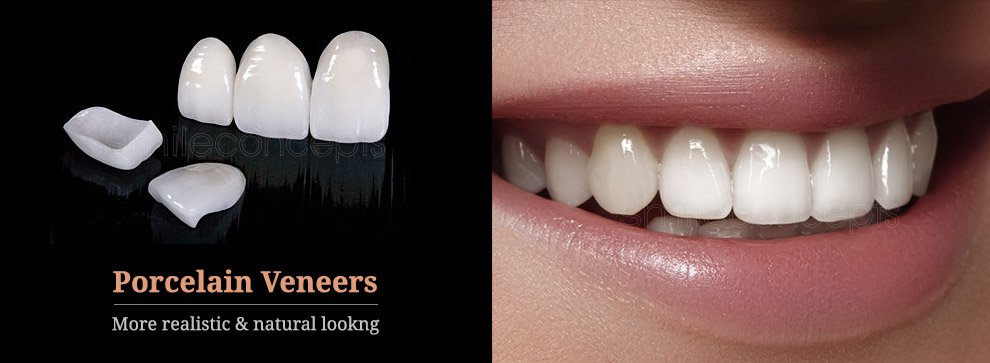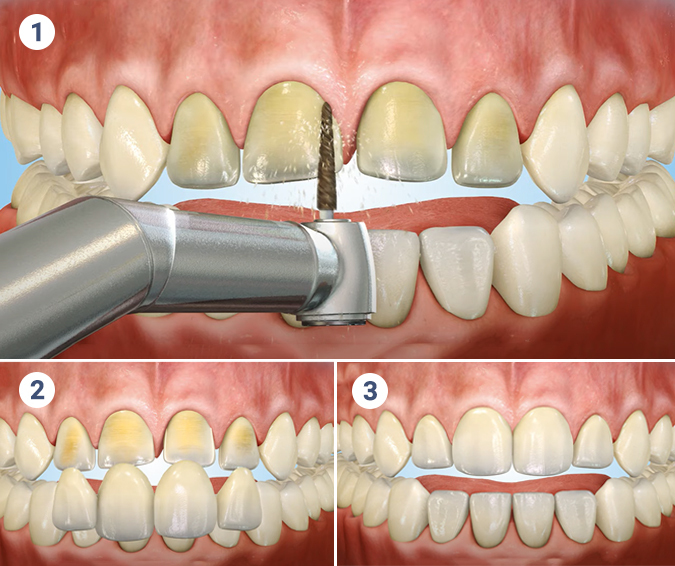Veneers Teeth Explained: Procedures, Care, and Longevity Tips
Opening the Keys of Veneers: Facts, Kinds, and Advantages for a Gorgeous Smile
Veneers offer a compelling remedy for those seeking to boost their smiles. These dental improvements can address numerous imperfections, from staining to imbalance. With choices like porcelain and composite, people can select based upon their requirements and choices. However, recognizing the subtleties of veneers, including application and care, is essential. What aspects should one take into consideration before deciding? The solutions might stun those thinking about this aesthetic dental option.

Recognizing Veneers: What Are They?
Veneers are thin, tailor-made coverings created to cover the front surface of teeth, boosting their look. Normally crafted from resilient materials, these shells are customized to fit each person's teeth precisely. They serve multiple objectives, consisting of dealing with visual flaws such as discoloration, chips, or spaces. The application procedure involves a dental professional preparing the teeth, often by removing a percentage of enamel to guarantee a tight fit. As soon as prepared, the veneers are bonded to the teeth using a strong adhesive.
Patients often select veneers for their capacity to develop a natural-looking smile while giving a lasting solution to dental blemishes. Unlike various other aesthetic dentistry options, veneers require marginal invasive procedures, making them a prominent option. The outcome is an improved smile that can significantly improve a person's confidence and self-esteem. On the whole, veneers supply a reliable approach to accomplishing a more attractive and harmonious dental look.
Kinds of Veneers: Porcelain vs. Composite
When considering cosmetic dental alternatives, two main sorts of veneers stand out: porcelain and compound. Porcelain veneers are crafted from a long lasting ceramic material that resembles the all-natural look of teeth. They are understood for their tarnish resistance and capacity to reflect light similarly to all-natural enamel, offering a visual charm that numerous individuals desire. The application procedure typically entails even more preparation of the tooth structure and may need multiple check outs to the dentist.
On the various other hand, composite veneers are made from a tooth-colored resin that is straight related to the teeth. This type permits for quicker application and can commonly be finished in a single see. While they are more economical than porcelain veneers, they may not provide the exact same longevity or resistance to staining. Eventually, the option between porcelain and composite veneers depends on specific preferences, spending plan, and details dental demands.
The Benefits of Deciding On Veneers
Choosing veneers offers many benefits that can substantially boost both the aesthetics and functionality of a person's smile. Among the key benefits is their ability to remedy imperfections such as staining, gaps, and imbalance, leading to a much more consistent appearance. Veneers can additionally enhance the resilience of teeth, providing a safety layer that guards them from damage.
They need very little tooth prep work contrasted to various other oral treatments, protecting even more of the all-natural tooth framework. This preservation adds to a healthier dental setting while still attaining a spectacular smile.
Veneers are extremely personalized, allowing people to select the shape, size, and shade that ideal fits their preferences. In addition, they are stain-resistant, making it easier to maintain a attractive and bright smile gradually. Overall, veneers present an effective option for those seeking both cosmetic enhancement and long-lasting oral health advantages.
The Veneer Application Refine
The veneer application process entails several crucial steps to assure suitable outcomes. At first, an assessment is performed to evaluate the person's needs, followed by the prep work and shaping of the teeth. The veneers are bonded in place, with changes made for an excellent fit and look.
Preliminary Appointment Steps
An extensive initial consultation is necessary for anyone considering veneers, as it sets the foundation for an effective therapy. Throughout this meeting, the oral professional evaluates the individual's dental wellness, going over any existing concerns that might affect the veneer application. This evaluation might include X-rays and an aesthetic exam to establish the condition of the teeth and gum tissues.
The dental expert also engages the patient in a thorough conversation regarding their visual goals, preferences, and expectations. They may provide numerous veneer choices tailored to the patient's certain needs. Additionally, the specialist describes the treatment, prospective dangers, and aftercare needs, guaranteeing that the individual is comfy and well-informed prior to proceeding with the treatment.
Prep Work and Shaping Teeth
After the first consultation, the following stage includes the preparation and shaping of the teeth to fit the veneers. This essential step is done by the dental practitioner, that meticulously analyzes the tooth structure to figure out the amount of enamel that requires to be eliminated. Generally, a thin layer, normally around 0.5 millimeters, is slashed off to assure a correct fit for the veneers. Accuracy is extremely important throughout this process, as it affects both the total comfort and the aesthetic outcome. As soon as the teeth are sufficiently shaped, impressions are required to create personalized veneers that straighten perfectly with the person's oral profile. This precise prep work establishes the phase for a successful veneer application, enhancing both appearance and feature.
Bonding and Last Changes
Following the shaping and preparation of the teeth, the bonding procedure starts, marking an essential stage in the veneer application. Throughout this phase, a dental adhesive is related to the ready tooth surface, ensuring a solid bond in between the tooth and the veneer. The dentist diligently places the veneer, making modifications to accomplish the desired alignment and looks. As soon as appropriately put, a special light is utilized to heal the sticky, strengthening the bond. After healing, the dental professional performs final changes, trimming any type of excess product and fine-tuning the veneer's shape to guarantee an all-natural look. This careful attention to information enhances both feature and visual appeals, adding to an overall lovely smile that is additional info resilient and resilient.
Caring for Your Veneers: Upkeep Tips
Caring for veneers is necessary to maintain their look and durability. A regular day-to-day cleaning routine, mindful evasion of tarnishing foods, and regular oral examinations are essential parts of effective upkeep. These techniques help ensure that veneers remain in peak condition and continue to improve one's smile.
Daily Cleansing Routine
Routinely keeping veneers is crucial for their durability and appearance. A proper daily cleaning regimen can help maintain their shine and prevent damage. Dentists suggest brushing two times a day with a soft-bristled tooth brush and fluoride toothpaste, ensuring that all surfaces are cleaned carefully to avoid damaging the veneer surface area. Flossing daily is additionally essential to eliminate food particles and plaque from between teeth, where brushes may not reach. Additionally, utilizing an antimicrobial mouthwash can help keep dental hygiene without harming the veneers. It is a good idea to avoid unpleasant cleansers and tools that can scrape the veneer. By following these simple steps, people can maintain their veneers looking beautiful while advertising general dental wellness.
Staying Clear Of Discoloration Foods
Although veneers are made to boost the appearance of teeth, their vulnerability to discoloring demands mindful nutritional options. It is essential for people with veneers to be mindful of certain foods and beverages that can cause staining. Dark-colored things such as coffee, red a glass of wine, and berry juices need to be consumed in moderation, as they are recognized to discolor both natural teeth and veneers. Additionally, acidic foods like citrus fruits canister weaken the bonding agents utilized in veneers, making them a lot more prone to staining. To preserve an intense smile, it is suggested to rinse the mouth with water after taking in staining foods and to practice normal oral health. These thoughtful options add significantly to the long life and looks of veneers.

Normal Dental Exams

Maintaining the honesty his response of veneers needs a commitment to regular oral check-ups, as these visits play a vital function in ensuring their durability and appearance. During these brows through, dental experts can examine the condition of the veneers, looking for any type of indicators of wear, damage, or underlying dental issues. Additionally, regular cleansings help remove plaque and tartar that can collect around the veneers, promoting general dental health. Dental professionals can also provide tailored recommendations on care methods and products fit for veneer upkeep. By adhering to a schedule of examinations, individuals can deal with potential issues early, guaranteeing their smile remains lovely and vibrant. Eventually, routine dental brows through are a crucial part of veneer treatment.
Is Veneers the Right Alternative for You?
Making a decision whether veneers are the right alternative frequently hinges on specific aesthetic objectives and oral requirements. For those seeking to address problems such as staining, chips, or misalignment, veneers can offer a transformative solution. Prospects normally include individuals with healthy teeth yet desire an enhanced smile.
It is vital to take right into account aspects such as tooth enamel problem, the extent of oral issues, and the willingness to preserve veneers. Consulting with an oral expert is crucial, as they can evaluate dental wellness and establish if veneers are appropriate
In addition, possible candidates must reflect on the long-term dedication, as veneers may need substitute every 10-15 years. Cost factors to consider additionally play a considerable duty, as veneers can be a substantial financial investment. Ultimately, the decision should be knowledgeable, stabilizing aesthetic desires with sensible considerations for lasting results.
Frequently Asked Inquiries
How Much Time Do Veneers Usually Last Before Needing Substitute?
Veneers usually last between 10 to 15 years before requiring replacement. Factors such as dental health, way of life selections, and worldly top quality can influence their longevity, making normal oral check-ups necessary for preserving their condition.
Are Veneers Safe for Individuals With Delicate Teeth?
Veneers can be risk-free for people with delicate teeth, yet it often depends on the seriousness of level of sensitivity and the dental expert's technique. Consulting a dental professional prior to proceeding is vital to guarantee excellent end results.
Can Veneers Be Gotten Rid Of or Replaced Easily?

Do Veneers Stain Over Time, and Just How Can I Avoid It?
Veneers can tarnish gradually, especially from foods and beverages like coffee or red white wine. To protect against discoloration, maintaining good oral hygiene, making use of a straw for drinks, and normal oral cleansings are recommended methods.
What Is the Price Array for Obtaining Veneers?
The cost of veneers usually ranges from $500 to $2,500 per tooth, relying on elements such as product kind, dental practitioner experience, and location. Individuals should talk to dental specialists for customized quotes and funding options.
When the teeth are adequately shaped, impacts are taken to develop customized veneers that straighten flawlessly with the individual's dental account. Throughout this phase, a dental adhesive is used to the prepared tooth surface area, ensuring a strong bond between the veneer and the tooth. It is vital to take right into account factors such as tooth enamel condition, the level of oral issues, and the determination to preserve veneers. Veneers can be secure for people with sensitive teeth, important site yet it typically depends on the seriousness of sensitivity and the dental expert's strategy. The cost of veneers typically ranges from $500 to $2,500 per tooth, depending on variables such as material kind, dental professional experience, and location.